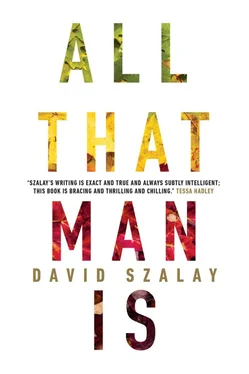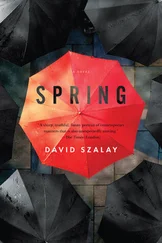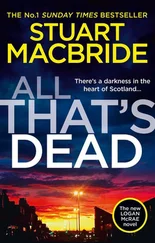‘I’ve had to accept,’ he says, matter-of-factly, ‘that my life, in terms of potential, is over.’
It’s as if he is trying to make up for not wanting to talk about what she wants to talk about — the forty-five years he has spent married to her mother, what was the story there — by talking with unusual frankness about something else.
That’s what he thinks himself as he starts to open the bottle, first nicking the lead foil, and then unpeeling it. With a satisfying heaviness, it separates from the glass underneath. He says, ‘I don’t have much left to offer. In a practical sense.’
‘You shouldn’t say that.’ She still seems distracted, her mind on something else.
‘Oh, I’ve achieved everything I’m going to achieve.’
‘Professionally, you mean?’
‘Yes. Partly. I mean, I’m not down in the mouth about it,’ he says. ‘I’m very proud of what I’ve achieved.’ Which is true. Even as he says it, though, he is aware of how weightless, how intangible, how even strangely fictitious, his achievements feel — even the ones he is proudest of, like his minor part in negotiating, over many years, the expansion of the European Union in 2004. Something, he is not sure what, seems to nullify them. He says, trying to maintain his philosophical tone, ‘I’m very proud. It’s just that that’s it now.’
‘Do you want a hand with that?’ Cordelia asks. She means the wine he is struggling to open.
He hesitates for a moment. He seems to think about what to do. Then he says, ‘Yes, okay, please,’ and passes it to her.
‘Now this wine,’ he says, obviously keen to talk about happier matters, ‘we got, your mother and I,’ he slightly emphasises, as if to point out that they did sometimes have fun together, which indeed they did, ‘some years ago, when we went down to Umbria, in the old Passat, may she rest in peace, and we got this wine in Perugia, I think. Anyway, it’s one of the best, supposedly, that they make down there, and I think it’s time it was drunk.’
‘Hear, hear,’ Cordelia says — though something is still missing from her voice.
He pours out two glasses, not too much in each, and slides one over to her.
‘So,’ he says. ‘To…?’
He waits a moment — long enough for her to smile, and shrug. The smile is wistful, sad, it withholds something, is unpersuaded.
He does not let it deflect him.
‘To life?’ he suggests.
She seems to weigh this up, then acquiesces. ‘To life.’
—
The next morning they drive to Ravenna. He needs to have another scan at the hospital. They take the new Toyota. Cordelia drives.
As they drive towards the sea the farming country gives way gradually to something more garish — the tourist economy of the sandy coast. There are signs for theme parks. Hotels. Everything shut up for winter. Except that the prostitutes who line Strada Statale 309 in summer are still there, though fewer. Bosnian girls, quite a lot of them, he has been told.
‘Poor things,’ he says.
Cordelia nods, driving.
They near Ravenna and there are signs for the Area Industriale . For the merchant port. She handles it all unproblematically — the tricky, poorly signposted approach, the Ravenna traffic, the one-way system; he is almost embarrassingly impressed by the way she handles it.
‘You’re doing very well,’ he says, as they stop at a traffic light somewhere in the city — she seems to know where they are, though he has no idea.
She laughs and says, ‘Thanks,’ and they set off again, with that sureness of purpose that so impresses him.
They decided, that morning, that they would have lunch in town, and then present themselves at the hospital for his appointment, which is at two o’clock.
They park in a public lot near the Zona Monumentale , and start to walk. They are looking for a hat for him. She wants to get him one for Christmas.
Via Cavour is hung with Christmas decorations, and the smart little shops shine in the darkness of the day. They stop at shops that seem promising and in the end he gets a soft brown Borsalino, which somehow fits his thin face. His face is thin now, and haggard-looking. The damage from the accident persists in nasty yellowish patches. Obviously pleased with the hat, he wears it as they look for somewhere to have lunch. They find a place on Via Maggiore that he thinks he once went to, years ago, and, if it was the same place, has positive memories of. Snow is starting to drift down in small flakes when they go in, into the sudden, stunning warmth, and ask for a table for two.
‘This is the place,’ he tells her, as, having shed their outdoor things, they sit down.
‘Okay.’
‘The food’s excellent. Or was. Now, who knows.’
The decor definitely tends to kitsch.
There is no written menu. Just a jovial man who wanders up and tells them, as if they were old friends, what he has today.
When they have told him what they want, someone else — a small woman, with a face as hard as a dried pea — arrives with his quarter-litre of red wine, and Cordelia’s green bottle of sparkling water.
All around them, office workers, it seems, are eating lunch.
Outside the snow is still falling.
He is trying to tell her about Amemus eterna et non peritura , about ‘the eternal passing of time’. It is on his mind again. This morning he woke very depressed. He lay there for some time, not moving as the turquoise walls appeared. The hospital loomed, that was part of it. The CAT scan, and whatever news it had for him. He has been having headaches, the last few days. He has been as weirdly aware of what’s happening in his head as he has been for months now with his heart. That sense of physical fragility frightened him during the night, and he tried to find again the feeling he had last week of everything impermanent embodying, through the very fact of its impermanence, something endless and eternal.
He is trying to explain that now to Cordelia.
‘It’s important,’ he says, struggling to make sense, he can see that on her face, ‘to feel part of something larger, something…something permanent.’
‘Yeah,’ she says patiently, pouring herself some more water.
She doesn’t see the point of this, he thinks.
He’s not sure he does either. It seems so elusive, even to him, when he tries to put it into words — or indeed when he doesn’t.
‘I’m not making much sense,’ he apologises.
‘No, it’s interesting,’ Cordelia says.
The pasta dish arrives — some sort of massive ravioli, in a heavy iron frying pan, still sizzling, which the hard-faced woman puts down without a word on a wooden place mat, and leaves there for them to serve themselves.
‘ Grazie ,’ he says, as she walks away.
He is still trying to formulate his thoughts, what he was saying to Cordelia, trying to say.
Hungrily, she has started on the ravioli.
‘Is it okay?’ he asks.
‘Lovely,’ she says.
And he is very moved, suddenly, by the sight of her.
Overwhelmed.
His eyes overflow.
She notices his moist-eyed stare and smiles at him, questioningly.
Feeling foolish, he shakes his head, declining to explain, and starts to eat. In a sense this love he feels just makes it more awful, not less, that this is all going to end. It is extraordinarily painful to think that there will be a day when he sees her for the last time.
Still nearly tearful, he stops eating for a moment and looks up.
There is a sense, he is sure, in which he is tricking himself into these feelings, about everything embodying something endless and eternal. Fear and sadness are obliging him to come up with something. Something to soften the nightmarish fact of ageing and dying. These ideas about the eternity of time. Within the eternity of time there is only a mystery — only a sense that there is something that we will never know or understand. An empty, unknowable space. Like, in Sant’Apollinare Nuovo, that mosaic of the curtains opening to show us nothing, only a patch of plain golden tiles.
Читать дальше












